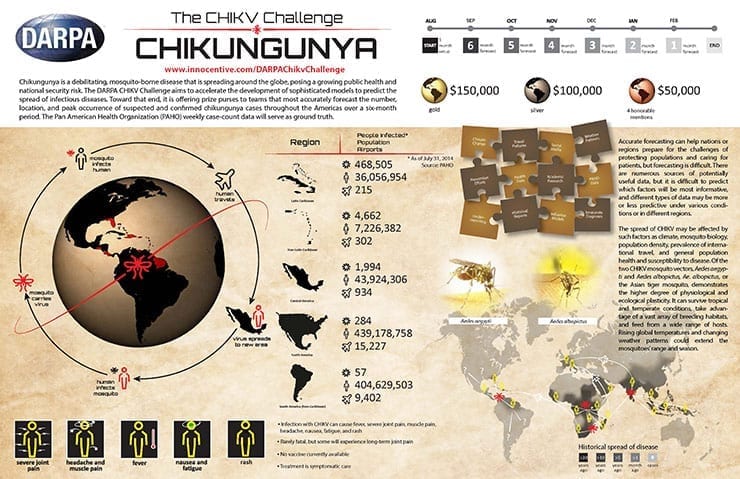To accelerate the development of new infectious disease forecasting methods, the Defense Advanced Research Projects Agency (DARPA) last year launched its CHIKV Challenge competition.
Thirty-eight teams from around the world vied to develop the most accurate predictions of CHIKV cases for all Western Hemisphere countries and territories between Sept. 2014 and March 2015.
On May 12, DARPA unveiled 11 winners of the competition during a scientific review event held at the Agency’s offices in Arlington, Va.
The event, which included representation from the Centers for Disease Control and Prevention (CDC), the U.S. Department of Health and Human Services (HHS), the Department of Defense (DoD), and the White House Office of Science and Technology Policy (OSTP), highlighted results, lessons learned and potential next steps to improve state-of-the-art infectious disease forecasting.
Six teams provided the most accurate results overall and earned the following prizes:
- Gold: Joceline Lega and Heidi Brown, University of Arizona ($150,000)
- Silver: Mark Leany, Utah Valley University ($100,000)
- Bronze: Ioannis Pantazis, University of Massachusetts ($50,000)
- Bronze: David Roberts, John Radcliffe Hospital, Oxford, United Kingdom ($50,000)
- Bronze: Sean Moore, Johns Hopkins University ($50,000)
- Bronze: A. Townsend Peterson, University of Kansas ($50,000)
DARPA also awarded a $10,000 prize to each of five teams that excelled in particular challenge domains:
- Best Applicability Methodology: Dhananjai Rao, Miami University of Ohio
- Best Computational Requirements Methodology: Ann Fruhling, University of Nebraska Omaha
- Best Data Sources Methodology: Tingzhuang Yan, Coastal Carolina University
- Best Presentation: Ajitesh Srivastava, University of Southern California
- Best Robustness Methodology: Diego Ruiz-Moreno, University of Michigan
The chikungunya virus (CHIKV) is quickly spreading through the Western Hemisphere; as of May 15, 2015, the Pan-American Health Organization (PAHO) had tallied close to 1.4 million suspected cases and more than 33,000 confirmed cases since the virus’ first appearance in the Americas in December 2013.
Spread by mosquitoes, chikungunya is rarely fatal but can cause debilitating joint and muscle pain, fever, nausea, fatigue and rash, and poses a growing public health and national security risk. Governments and health organizations could take more effective proactive steps to limit the spread of CHIKV if they had accurate forecasts of where and when it would appear. But such predictions for CHIKV and other emerging infectious diseases remain beyond the reach of current modeling capabilities.
“Predicting the speed, severity and direction of infectious disease outbreaks is incredibly challenging, in part because it’s difficult to determine the relative contributions of multiple factors—such as weather and climate, population density and travel patterns—under various conditions,” said Col. Matt Hepburn, DARPA program manager for the CHIKV Challenge.
Yet in just six months’ time, the participants made notable progress, Hepburn added. “The teams in the CHIKV Challenge identified gaps in current forecasting capabilities and created a set of tools that can immediately help improve forecasting and guide response decisions for the current chikungunya outbreak. We are on the cusp of enabling a revolutionary improvement in disease forecasting, in much the way that weather reports transitioned from surveillance to forecasting.”
DARPA invited Los Alamos National Laboratory (LANL) to independently analyze the accuracy and methodology of the teams’ research. LANL found that, in general, the best performers used simpler models and that quality of data mattered more than quantity; in fact, gaps in reported data were more easily accommodated via modeling than misreported data.
By design, CHIKV Challenge participants were allowed to update their predictions every two months as they learned from experience—a challenge structure that sped development of better methods. On average, the top participants succeeded in doubling the accuracy of their predictions every two months relative to their initial forecasts.


